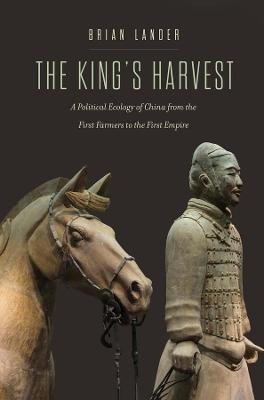
The King's Harvest
A Political Ecology of China from the First Farmers to the First Empire
Seiten
2022
Yale University Press (Verlag)
978-0-300-25508-9 (ISBN)
Yale University Press (Verlag)
978-0-300-25508-9 (ISBN)
A multidisciplinary environmental history of early China’s political systems, featuring newly available Chinese archaeological data
“Over four thousand years of unsustainable growth, Chinese states replaced a diverse ecosystem with a monocropping grain state. All states destroy environments, but only the state can save us. So ancient China's spectres still haunt our modern crisis. A brilliant and disturbing analysis!”—Peter C. Perdue, author of Environmental History in China and the West: Its Origins and Prospects
This book is a multidisciplinary study of the ecology of China’s early political systems up to the fall of the first empire in 207 BCE. Brian Lander traces the formation of lowland North China’s agricultural systems and the transformation of its plains from diverse forestland and steppes to farmland. He argues that the growth of states in ancient China, and elsewhere, was based on their ability to exploit the labor and resources of those who harnessed photosynthetic energy from domesticated plants and animals. Focusing on the state of Qin, Lander amalgamates abundant new scientific, archaeological, and excavated documentary sources to argue that the human domination of the central Yellow River region, and the rest of the planet, was made possible by the development of complex political structures that managed and expanded agroecosystems.
“Over four thousand years of unsustainable growth, Chinese states replaced a diverse ecosystem with a monocropping grain state. All states destroy environments, but only the state can save us. So ancient China's spectres still haunt our modern crisis. A brilliant and disturbing analysis!”—Peter C. Perdue, author of Environmental History in China and the West: Its Origins and Prospects
This book is a multidisciplinary study of the ecology of China’s early political systems up to the fall of the first empire in 207 BCE. Brian Lander traces the formation of lowland North China’s agricultural systems and the transformation of its plains from diverse forestland and steppes to farmland. He argues that the growth of states in ancient China, and elsewhere, was based on their ability to exploit the labor and resources of those who harnessed photosynthetic energy from domesticated plants and animals. Focusing on the state of Qin, Lander amalgamates abundant new scientific, archaeological, and excavated documentary sources to argue that the human domination of the central Yellow River region, and the rest of the planet, was made possible by the development of complex political structures that managed and expanded agroecosystems.
Brian Lander is assistant professor of history at Brown University and a fellow of the Institute at Brown for Environment and Society.
| Erscheinungsdatum | 11.01.2022 |
|---|---|
| Reihe/Serie | Yale Agrarian Studies Series |
| Zusatzinfo | 26 b-w illus. |
| Sprache | englisch |
| Maße | 156 x 235 mm |
| Themenwelt | Geschichte ► Allgemeine Geschichte ► Vor- und Frühgeschichte |
| Geisteswissenschaften ► Geschichte ► Regional- / Ländergeschichte | |
| Sozialwissenschaften ► Politik / Verwaltung ► Politische Theorie | |
| ISBN-10 | 0-300-25508-X / 030025508X |
| ISBN-13 | 978-0-300-25508-9 / 9780300255089 |
| Zustand | Neuware |
| Informationen gemäß Produktsicherheitsverordnung (GPSR) | |
| Haben Sie eine Frage zum Produkt? |
Mehr entdecken
aus dem Bereich
aus dem Bereich
Was Pompeji über uns erzählt
Buch | Hardcover (2023)
Propyläen (Verlag)
CHF 44,75
auf den Spuren der frühen Zivilisationen
Buch | Hardcover (2023)
C.H.Beck (Verlag)
CHF 27,95


